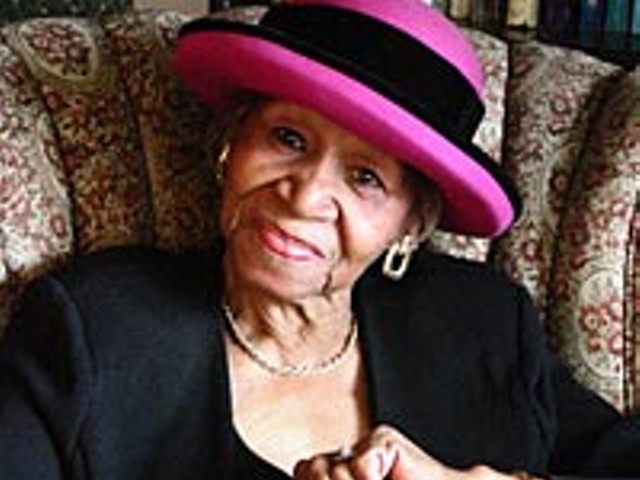DJ Lenn Swann remembers the time he saved Eminem’s ass. He and the then-emerging rapper were in New York playing an industry showcase gig at a club called the Wetlands. Em and Swann were sharing the bill with the Cocoa Brovas, a rowdy New York crew that just wasn’t about to let a Detroit MC take their stage.
“They told Em if he wanted the mic, he had to come get it,” Swann remembers. “They had sabotaged his DAT tape [of backing music], so all we had for music was me scratching. But the crowd didn’t mind that the tape was messed up. New York’s a hip-hop town, they respected that it was just an MC and a DJ.” Detroit, well, that’s another story.
Swann has plenty more stories like this. He provided the beat for D12’s MC Proof when he won the Source magazine’s prestigious Unsigned Hype competition in 1999. Swann (ne Leonard Adams) has a platinum record from Interscope/Shady Records for supplying the scratches on “’97 Bonnie & Clyde” from Em’s Slim Shady LP. He has toured Europe with Slum Village, opened for Outkast in East Lansing, Linkin Park at Cobo Arena, and rocked the crowd at the inaugural Detroit Electronic Music Festival in 2000. With his DJ crew 12 Tech Mob (DJ Dez, Daddy Riff and Jacksonville-via-Detroit and former Goodie Mob DJ Shotgun) Swann has co-produced booty tracks like “Ride” that are still staples of Detroit’s weekend mix shows on WJLB -FM 97.9 and WDTJ-FM 105.9.
But where he has most made a name for himself among hip-hop purists are the battles, competing against other scratch DJs around the world. He is, by his own estimation, among the top 15 scratch DJs in the world, in the top 10 in the United States.
Like most kids growing up in Detroit in the ’80s, Swann was inspired by the electicism of the Electrifying Mojo, the technical flash of the Wizard (techno icon Jeff Mills’ former on-air persona). Seeing Run DMC’s Jam Master Jay prompted Swann to scratch. And the sheer inventiveness of fellow West Side trickster DJ Rotator — notorious for performing hip-hop tricks with crazy jungle tracks, spinning records backward and upside down using an ingenious system of rubber bands between his decks — showed him how far the limits of turntablism could be pushed.
In his 11 years as a competitor, Swann has prevailed in about every battle he’s entered, from Toledo to New York to London. Last summer he made it to the semifinals at Cincinnati’s Skribble Jam, “the Woodstock of underground hip hop” as Swann calls it (the competition where Eminem first distinguished himself as an MC in the late ’90s, losing to fellow Midwesterner Scratch Bastid).
Swann has won the Detroit KoolMixx DJ competition (sponsored by the cigarette company) three years running, and has gone to the regional finals of the two biggest DJ competitions in the world, the DMC and International Turntable Federation.
Swann’s skill as battler has enabled him to earn a living. He’s something of a turntable gunslinger, traveling from one battle to the next, living off modest cash prizes. (Average purse: $2,500; he estimates his yearly spoils run in the low 5-digit range). His touring expense load is lightened with sponsorship from audio gear manufacturer Rane.
Sometimes the duels even find him. Late last July while preparing for a family picnic, a pal phoned him about a Foot Action- and Adidas-sponsored DJ battle on Belle Isle. “So I put my records in the trunk with the fishing pole and the picnic basket,” he laughs. “And I won. So as soon as the lights came on after the blackout, I was on a plane for New York playing at the Apollo showcasing in front of [legendary on-air DJ] Red Alert and [rappers] Cam’ron and the Diplomats.”
The platinum record, the Em pedigree, the radio hit, the international recognition. So how is it Detroit still doesn’t know who the fuck Lenn Swann is?
“The climate in Detroit right now is that everybody raps, but there’s no crews with DJs,” explains Swann. “It used to be that the better your group was, the better your scene was, and the DJs were a big part of that.
“What really influenced me was the old [late ‘80s] Detroit culture, when all the rappers like Awesome Dre and Kaos had DJs like Maestro and Los, or AWOL with DJ Homicide. What’s missing now [in Detroit] is that respect for all the elements of hip-hop. Hip-hop is the whole culture — the DJ, the graffiti writers, the breakdancers, not just the rappers.”
Swann has a point. But in an industry where rappers are far more commercially consumable than scratchmasters (whose salable output is usually limited to mix CDs of others’ music unless they make the jump to producing), and in a city where the term “Detroit DJ” still invokes the spirit of techno and house jocks like Derrick May and Stacey Pullen, Swann toils in relative obscurity. At 29, Swann is the elder statesman to a small but gifted scene of underground battlers that includes talented new jacks like Ann Arbor’s Virus and Alfredo “Alf 1” Meyers.
While their turntable battles lack the heroic swagger of the MC combats depicted in 8 Mile, they are no less thrilling. (Or as co-opted by mainstream culture: Witness the use of DJs and cutting and scratching in TV ads these days — Sprite Remix, anyone?) Swann, Alf, Virus and a handful of others spend hours practicing scratch routines that mix technical wizardry like beat juggling (back and forth between two records while maintaining a single beat) with crowd-pleasing body part ploys (using mouths and elbows to work the mixer), in an attempt to realize the perfect blend of personality and jaw-dropping tricks.
Swann calls his style “mixing technical skills with funk-dified scratches.”
If he were wielding a guitar instead of turntables, he could be a kind of contemporary Hendrix, culling next-world sounds and timeless soul out of otherwise conventional instruments.
But in hip-hop respect and money are two different things. To that end, Swann’s been polishing his production skills with the label Fallen Angelz Entertainment. His latest effort is an album of beats featuring national MCs with Michigan roots, like ruffneck-femme MC Boss and her protégé Abyss, as well as Flint-bred rappers MC Breed and the Dayton Family’s Bootleg. He has a solo record, Killa Techniques, planned to showcase not just his DJ skills, but his musicianship as well, as he programs, plays bass and raps on all tracks. The progression is a natural, forward-thinking one.
Over the past few years, hip-hop DJs have become the soul of modern music. Bands as diverse as Sugar Ray, Limp Bizkit and neo-speed-metallers Slipknot employ DJs, not just to scratch, but to produce much of their music. Before Kid Rock was making neo-classic rock, you might remember, he was a basement-party-rocking DJ in Mt. Clemens. In many ways, Rock is still the consummate DJ, only instead of mixing and scratching records, he now cuts and pastes genres. Part conductor, part aesthetician, part music librarian, the hip-hop DJ is the archetypal music producer and transcendent fan-as-artist, expressing ideas through other peoples’ music. And Swann will soon articulate his own ideas through his own music.
“In hip hop, there’s always an unsung hero and it’s usually the DJ,” Swann says emphatically, which is why, with his artist album, he’ll finally be the one singing.
For more info on Lenn Swann, visit www.fallenangelzent.com.
Read other stories in the SOUL PURPOSE: DETROIT HIP HOP 2003 series.
Hobey Echlin is a freelancer writer. E-mail [email protected]





